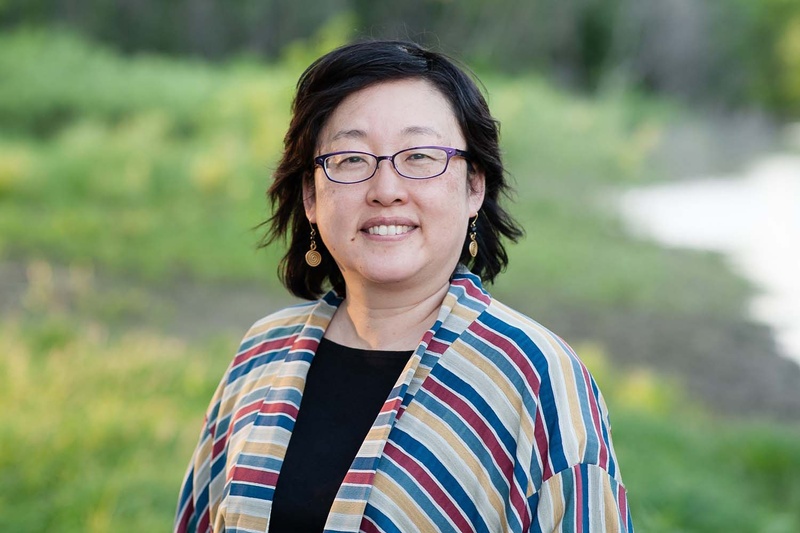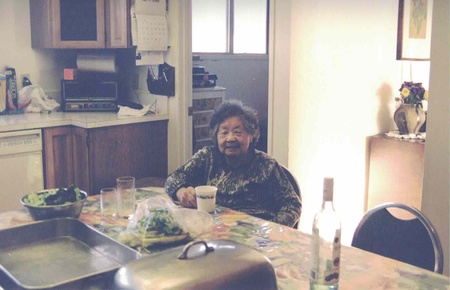Nation of Birds
What if our only home were the air
And our wings flapping through it?
And time the space we lived in
And the nest, a current for our eggs?
What if there were no abode but
Shore or field, one day to the next,
The wide sky, the only true resting place
Made of movement and yearning
For a never-arriving home?— Sally Ito
In Winnipeg poet/teacher/translator Sally Ito’s memoir, The Emperor’s Orphans (TEO), readers are taken on a journey of self-discovery of her Japanese Canadian heritage. As we have fewer and fewer elders to tell us about our Japanese Canadian experience, this important work fills a huge void in the narrative of our story as a community.
Ito’s experience is one that we all share to some degree. It touches on experiences like growing up Asian at a time when we were often the only non-white students in our suburban classrooms and communities where we grappled for a sense of identity.
Born in Taber, Alberta, Sally is the author of three books of poetry: Frogs in the Rain Barrel, Session of Mercy and Alert to Glory. She is also the translator of Are You An Echo? a collection of poetry by Misuzu Kaneko. This is her first book of nonfiction.
* * * * *
First, thanks for doing this interview, Sally. I love the Jung quote about personal myth at the start of the book. When we read TEO, how much of your memoir is myth and truth?
I think of myth as the interior truth of a situation or story, so it is what the writing of a story reveals to the writer in his/her telling of it. This does not mean ‘myth’ is not ‘factual’ but rather that it embodies a psychologically felt truth on the part of the writer or storyteller.
You seem too young to me to be writing a memoir. What is the significance of the timing of this? Were you writing for a particular audience?
Ten years ago when I began working on this book, I thought I was too young, too! But now I’m over fifty and not so young anymore to feel that way. And I also did feel back then, that this book was not about me, but rather about my parents and grandparents, and also for my children.
What is the significance of the title?
Some might think it controversial that the cover picture of the late Emperor Hirohito is paired with my Canadian born father and his brothers, but I felt my father’s family, as Japanese Canadians, were ‘orphans’ of the Japanese empire, in a diaspora sense. They were children, and Canada rejected them as a kind of wartime flotsam because they were of Japanese descent, and so were of orphaned of their identities because of the war.
You make a point of paying homage to a ‘rich culture of complexity and culture’ that we Nikkei come from. What is the importance of this?
I think everybody in looking at their cultural heritage whether that be British, Irish, Chinese or French, Metis or Indigenous, can find themselves to be from rich cultures. But whether, you, as an artist, steep yourself in the culture of your heritage, is a choice. Modernity, globalization, migration—these things essentially rob the self of a particular fixed identity of place with its attendant expressions in the arts. I think as an artist, I have always found Japanese aesthetics and sensibility appealing, and felt it a never-ending source of inspiration, as I say in my book. To maintain ‘culture,’ one must choose to ‘practice’ it.
What was it like for you growing up in Sherwood Park, Alberta? Was it hard to be JC there?
Sherwood Park was in many ways, a very white place. It was middle-class suburbia, and in a place like that, one learns to get along with others by being invisible.
Were there any other JCs there?
Yes, there were other Japanese Canadians in the Park, but very few. My mother, though, got to know through church connections, other Japanese living in the Park, and so I probably had more connection with Japanese people than Nikkei.
You write about going to the Japanese language school. How important was that experience?
The Japanese school was important in my formation as a Japanese Canadian writer. I did not like going to the school except to meet my friends, but those friendships have been lifelong because we shared similar isolating experiences of being Japanese Canadians in largely white suburban neighborhoods while growing up.
Like you, I never shared my middle name Masaji whenever the topic came up. Why was “Sachiko” a secret name? How do you feel about sharing it with others these days?
Well, middle names are not usually used by most people, but ‘Sachiko’ really was my Japanese name, and so my mother used it with me all the time. She called me ‘Sa-chan’ which could just as well refer to ‘Sally,’ I guess, but because my mother called me this and spoke to me in Japanese, Sachiko embodied, to me, my Japanese self. I don’t often have the chance to share it with others; most people know me as Sally and that is fine. I never really used ‘Sachiko’ when I was in Japan; I still used Sa-ri written in katakana.
Given your family connections to Japan and your fluency in the language, how does this affect your relationship with your ”Japaneseness”?
Greatly. Fluency in the language is so essential, and of course, that has helped make my relationships with my relatives so much more deeper than if I didn’t have the language.
Were your siblings affected similarly?
My siblings were also affected in the same way. My brother and sister both have Japanese spouses, and they operate in dual-language homes. Because my husband is not Japanese, my children do not have the same fluency as my siblings’ children do.
What are the cultural metaphors that were most significant when growing up?
The traditional arts of Japan still hold a great appeal to me - in particular, those arts having to do with writing and text, as well as the visual and in crafts. There is a selfless quality to the Japanese arts that I feel very strongly sympathetic to that is somewhat antithetical to the pervasive sense or need for self-expression that I see in western art.
Your story is very much one of a middle-aged post-WW2 generation that still grapples with the experience of being of Japanese descent and whose parents and/grandparents went through the horrors of internment. Do you still grapple with this history and issues of identity?
In the preface to my book, I talk about the epiphanic moment when I realized why I became a writer—I became a writer because I wanted to know who I was culturally as a Japanese Canadian. Who am I? Isn’t that the question we all ask of ourselves at some point in our lives? In the preface, I mention how stating of the question was like a deflation of a balloon - it was a release, but I couldn’t just walk away, after that, because things still were happening, new information was being released that I was discovering, for example, about my Nisei aunt.
Can you describe what kind of life the Itos in Surrey BC had? Sixty acres is a huge amount of land.
The Itos had a rich life in an agrarian community made up of others like themselves. It was pastoral and bucolic from what I have read. The Japanese Canadians in Surrey grew strawberries, raised chickens, even kept angora rabbits. There were cooperatives, churches, and halls. My aunt mentioned fishing and picnicking jaunts to White Rock. Much of the information I learned about the Surrey community came from a self-published book by Michael Hoshiko titled Who was Who: Pioneer Families in Delta and Surrey. Books like this one provide facts and anecdotes, and for the storyteller, become the basis for the myth of one’s self-creation in terms of identity formation.
Did your family appeal to the Bird Commission?
The Ito family did appeal to the Bird Commission, but the only file I looked into extensively was my great Aunt Kay’s claim made by her husband of the time, Charlie Imahashi. There was a claim also made by my great grandfather Saichi and his son, Jack, which I think is more extensive, and is probably worth investigating, but as these discoveries were made late into the process of my editing my book, I did not have the wherewithal to investigate them at length and include them in the book. I did discover things about my Aunty Kay though, in government correspondence with her about the land she owned with her husband Charlie that did get into the book. And these things were painful to read and were things she never told me about.
Have you been there recently?
I haven’t been to Surrey recently but have visited there often while my grandmother was still alive and coming to Canada to visit, and also with my own family. My cousin Fumiko got married in St. Helen’s Anglican Church in Surrey because it was a significant landmark of the time when our grandparents lived there before the war.
When did you start writing this memoir? What has the journey been like?
I feel like I’ve been writing this all of my life! But really, it’s been a decade, I’d say, more or less, starting with the trip I took with my family to Japan in 2007.
© 2018 Norm Ibuki








